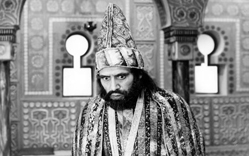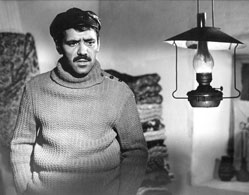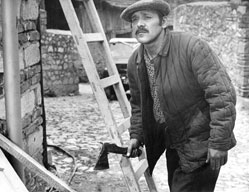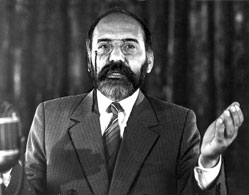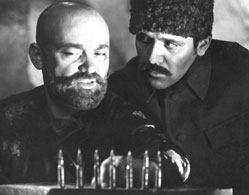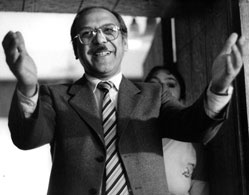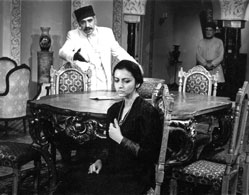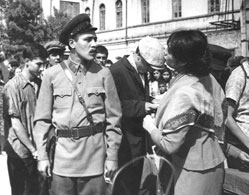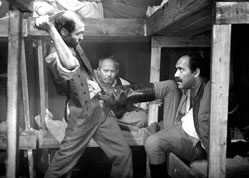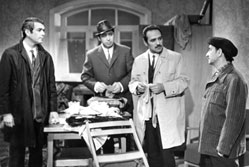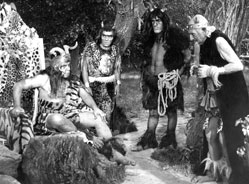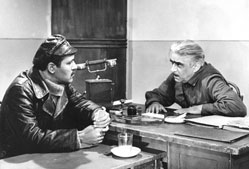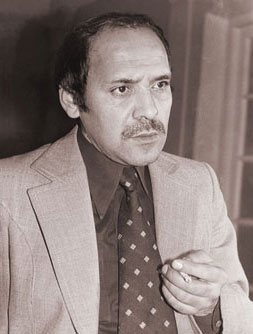 Pages 66-71
Pages 66-71by Aydin Kazimzadeh
“War and peace are the issues of our time. I have not seen war, but on a human level I understand that it is a grave crime against mankind. Everybody knows the havoc war has brought to people. It is no exaggeration to say that today the peoples of the world seek peace, neutrality and full national independence,” wrote actor Hamlet Khanizada in the late 1980s.
State Award laureate Hamlet Khanizada hated war and war-mongers. He was deeply worried about Armenian claims on Azerbaijan’s Karabakh region, and shocked by the massacre in Baku on 20 January 1990 carried out by Mikhail Gorbachev’s government. He could not settle at work or at home, nor could he stand idly by. This was in his nature. More of this later. Hamlet Khanizada was born in the village of Shagan, near Baku, in 1941. His father, Doctor Babir, loved the theatre, so he named his son after a dramatic hero. After secondary school Hamlet applied to the Medical University to become a doctor like his father, but he failed his exams. He came across an advert that was to determine his future. The advertisement read: “A two-year training course for actors is to start at the Mashadi Azizbayov State Drama Theatre of Azerbaijan. All applications welcome.” Hamlet started attending the courses and was told by prominent director Adil Isgandarov that he had the makings of a very good actor. This encouraged Hamlet even more. He applied to the University of the Arts to continue his studies, but again failed the final exam.
In 1961 he tried again and this time was successful. Hamlet renewed acquaintance with Adil Isgandarov at the university. The great artist initiated Hamlet The year 1964 saw an important development in Hamlet’s life: director Tofiq Kazimov offered him a job at the Drama Theatre. Kazimov was working on Shakespeare’s Anthony and Cleopatra at the time. He offered Hamlet the part of Gallus, one of Julius Caesar’s generals. It was Hamlet Khanizada’s first role, and his first play in his first theatre company. Hamlet had to justify director Kazimov’s decision to offer him a job when he was still a student and he didn’t let the director down. Hamlet later played Chandana (in A Pretty Indian Woman), Katovich (Stormy Year), Diseased Man (The Dead), Bertrand (A Girl from Orleans), Shaliko (Vaqif), Ali (Smoldering Fire), a gypsy boy (Living Corpse) and other minor and major parts.
When director Mehdi Mammadov staged the play Khayyam in 1970, he asked Hamlet to play Hasan Sabbah. This was a successful role for the young actor.
Hamlet went on to play a range of interesting roles including Iblis (Satan) in the play of the same name, Qajar in Vaqif, Molla Abbas in A Gathering of the Insane, Nizami in Atabays, Glagolev in The Kremlin Clock, Antonio in Storm, the eponymous hero of Tamerlane and the doctor in Fame or a Forgotten Man.
Some of the best actors of the day praised Hamlet’s acting. He won a StateAward for the role of Iblis. Hamlet won the hearts of the audience and his colleagues with his natural performances, honesty and emotion.
Hamlet worked with some of Azerbaijan’s best actors and directors, who helped him develop his art.
Then one day, Hamlet Khanizada unexpectedly left the theatre. His sudden departure sparked many rumours. Why did he leave? One newspaper wrote at the time: “He was not tired of art but of the light-hearted ‘plays’ that have become popular in the theatre, and of indifference and lack of appreciation.”
“The main reason for this move was the actor’s desire for a creative challenge and to play new characters,” another newspaper said. “He left the stage, which he loved passionately, for the film studio, got a job there and wanted to ‘play good roles’.”
Hamlet Khanizada told a newspaper reporter in an interview:
“When we serve the interests of art, no one cares about our rights. But when we care about ourselves … Write that Hamlet Khanizada abandoned theatre because of his material needs, because he could not live on the salary he received from the theatre.” The talented actor left the theatre for the Azerbaijanfilm studio, where he stayed until the end of his life. He became a full time member of the film studio staff.
For some, Hamlet Khanizada became a film actor with the roles of Gizir (in I Wish to Have Seven Sons) and police officer Dadash (in Find that Girl) in the 1970s. However, the actor made his cinematic debut long before those films. In the 1960s, he played minor roles in The Iceland of Wonders (1963, Sadiq); Soil. Sea. Fire. Sky (1967, an engineer); and in Our Jabish muallim (1969, the military commissar).
His performance in Our Jabish muallim was memorable for its convincing depiction of a wartime military commissar. Audiences also remember Hamlet’s Gizir in I Wish to Have Seven Sons. Gizir, the right-hand man of Garay bay, is cruel to members of the young communist league, the Komsomol. He is also clever and cunning. The actor was able to make Gizir one of the main characters of the movie by revealing his inner world to the audience. Gizir rides a horse and fires a gun using his only hand. These scenes are usually shot with stuntmen, but Hamlet Khanizada performed them all himself with aplomb.
Hamlet Khanizada loved cinema as much as he loved theatre, and film directors often cast him in their movies. He played Talibov in The Last Mountain Pass, Amash in Stab in the Back, Rakin in Qarib in the World of Jinns, Rizvan in On Fire, Sekhovshik in When the Owl Comes, Caliph Motasim in Babak, Lutfali bay in Golden Abyss, Haji Ilyas in Midnight the Day After Tomorrow, Majidov in My Only One, the head of the regional committee in Old Ferryboat, Amanullah in Another’s Life, Fuad in Boring Story and a party secretary in Special Situation.
The actor put his heart into each and every one of his characters and loved them, whether they were major or minor roles.
In the Last Mountain Path, Hamlet Khanizada played Talibov, a representative of the Soviet government. Together with Abbasqulu bay, he visits Karbalayi Ismayil and is killed on his way home.
The character does not have much to say, but the actor skillfully depicted a committed Bolshevik.
The character Imash, in Stab the Back, was one Hamlet’s most cessful parts in cinema. He played the role in a completely new way, making Imash one the main heroes of the film. Imash has both good times and bad. He even al years in prison, so whenever there is a crime, petty or serious, people mention his name. Meanwhile, his sister loves a man called Fazil, whom Imash does not like, and this makes him even angrier. The hero’s character becomes absolutely clear against the backdrop of events in the movie. Hamlet Khanizada seeks and fi nds special traits for the character of Imash, in his traditional siriqli jacket. We get caught up in the hero’s fate. Caliph Motasim, played by Hamlet Khanizada in the movie Babak, was another successful role. Although a minor part, as a historical person Caliph Motasim infl uences events in the fi lm. Hamlet Khanizada plays this role so skillfully that Motasim’s hatred for ‘Motasim is a hot-tempered man. At times, he is as pliable as the string of a bow. At times he laughs, and at times he shouts with anger. That is it. Everything else is up to you. It is your own business how to create this character, and what methods to use. You are fully independent on this.’ I really liked this method.”
Hamlet Khanizada plays Motasim as a half-sane man. The caliph is even ready to drink Babak’s blood. While ordering Afshin to capture Babak and bring him to the caliph, Motasim has a long monologue. He speaks passionately, his eyes becoming larger and larger. The caliph, who is a religious fanatic, stammers and gets nervous as he speaks. Viewers are also surprised by his strange behaviour.
In the last 10 years of his career, Hamlet Khanizada mostly acted in fi lms. He created both historical and contemporary heroes. His later roles include Malikov (Another Trace), Abu Bakir (Nizami), Nadir (When August Comes), Haji (The Window of Sorrow), Murtuzov (Warmonger), Qiyas Zeynalli (Exam), Molla Jafar (Pirverdi’s Cockerel) Pashayev (Devil Before Us), the factory director (Villain) and Poet, Sadi Afandi and the Diseased Man (The Day of Murder). Hamlet Khanizada could fi nd the diff erent traits that characterized each role. The tragicomedy Villain (Yaramaz in Azeri), tells the story of a good guy who later becomes a bad guy. The fi lm lays bare the woes of Perestroika and looks into the reasons for the deformation of a person and his moral decline.
The factory director, played by Hamlet Khanizada, is another negative character. There is a similarity and closeness between the characters of Iblis (Satan), which the actor played in the theatre, and the factory director.
The factory director is also capable of disguising himself and adapting to new situations when necessary. This role made the actor’s name as a performer of modern characters as well.
The Day of Murder, which was fi lmed on the basis of a novel of the same name by Yusif Samadoglu, is a tragedy about the historical and ongoing national drama of the people of Azerbaijan.
Hamlet Khanizada played three roles in this fi lm: the Poet, Sadi Afandi and the Diseased Man. Director Gulbaniz Azimzada explained why she asked Hamlet to play three roles at the same time. “There is no way to measure the mental suff ering, thoughts, joys and sorrows of each member of a cast. All these are small clips in a fi lm. “I knew Hamlet Khanizada, who played the main characters in the movie, from his roles in theatre and cinema. When I saw him playing Satan on the stage, I realized that a special character needed to be created for this actor. At that time I was preparing to make The Day of Murder. But Moscow (the central government) delayed this for years by creating problems with the fi lm script. In the meantime, I was working on the fi lm Exam, based on the novel Summer Days in the City by writer Anar.
Hamlet appeared in the fi lm. In the theatre, this role – Qiyas – had been played very well by actor Hasanaga Turabov. He created a mild-mannered character. But Hamlet did not have the face or appearance of a mild-mannered person. The fi lm’s creative team, including scriptwriter Anar, hesitated when Hamlet was approved for the role of Qiyas. Some even said: ‘This isn’t a role for Hamlet.’ But I was determined to have him in that role and we made the fi lm.
“Qiyas was fi lmed as a fi ghter, a morally strong person. The playwright also liked this character. It turned out that the hero could have been interpreted that way as well. Then I fi lmed him in a supporting role (Captain Father) in the fi lm When August Comes. But his main work was in The Day of Murder. He played three roles – a sick man of our time; Sadi Afandi, a prototype of Huseyn Javid, the great poet of the 1930s; and a medieval poet. Hamlet played these separate characters with just small changes in his makeup. The characters were connected with the main sequence of events. Hamlet took his work very seriously. He was a thinking actor…” Sadi Afandi is a character who has been through many diffi culties in life and who has lived the life of an artist. This character is as complex as he is contradictory.
Sadi Afandi is representative of the hundreds of artists who fell victim to Stalin’s purge of the 1930s.
The actor found very original details to portray Sadi Afandi and managed to express all his suff erring and pain through his facial expressions.
The filming was over and the team were editing when the horrible events of 20 January 1990 took place. Hamlet was deeply aff ected by the massacre of innocent civilians by Soviet troops. He had a brain hemorrhage and passed away at the height of his career. Editing was eventually fi nished for The Day of Murder. Actor Fuad Poladov was asked to do the voice-over for Hamlet Khanizada, as his voice was similar to Hamlet’s.
When Hamlet’s face fi rst appeared on screen, Fuad could not speak. He saw Hamlet and sobbed. But then it went well. Fuad did the voice-over and it sounded as though it were Hamlet himself speaking. Hamlet Khanizada lived only 49 years. He was a prolifi c theatre and cinema actor, creating valuable characters that have remained in the history of Azerbaijani theatre and cinema. Hamlet Khanizada won love and respect through his hard work and skill as a performer. He lives on in the memory of his public and the many fi lm roles he created..
